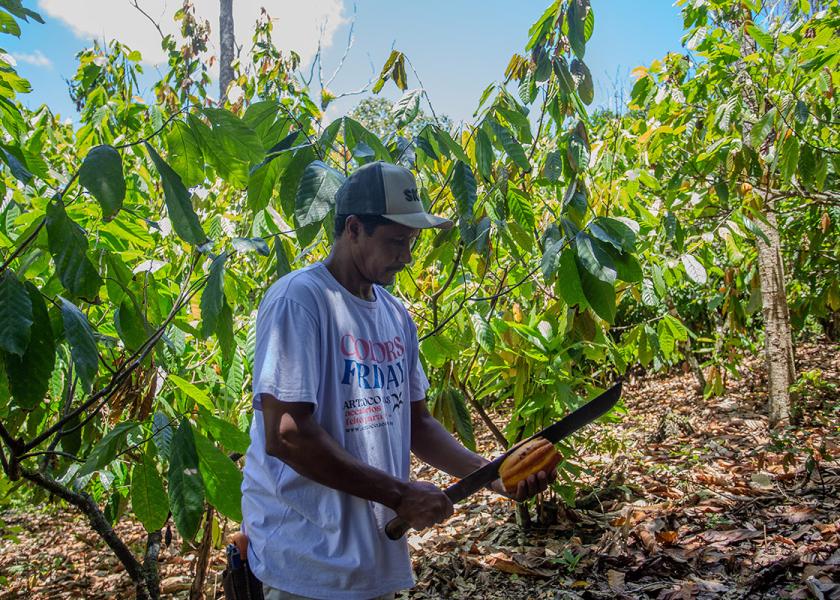ReSeed and FoodChain ID partner to promote transparency, regenerative ag

As global warming and climate change continue to make headlines, increasingly, players across the fresh produce supply chain are setting ambitious and well-publicized goals to reduce their carbon footprint — and with good reason.
While the United Nations estimates the food and agriculture industry currently contributes over one-third of the total global greenhouse gas emissions, less than 1% of carbon credits on the market are sourced from agriculture, a University of California, Berkeley, study finds.
At the same time, on-pack carbon emission claims for food and beverage products have surged in recent years. Such claims grew at a 33% compound annual growth rate between July 2018 and June 2023, according to Innova Insights/Nutrition Insights.
In response, FoodChain ID, a global sustainability certifier, and ReSeed, a provider of full life-cycle carbon-credit traceability, have partnered on a new carbon-credit verification standard that aims to incentivize, measure and verify the progress of carbon sequestration through regenerative agriculture practices.
The companies say their partnership combines the Fairfield, Iowa-based FoodChain ID’s more than 25 years of sustainability certification and verification experience with Pittsburgh-based ReSeed’s artificial intelligence-powered digital ledger transparency platform to answer a specific market need with independent verification of carbon credits.
“The partnership between FoodChain ID and ReSeed establishes a new paradigm in sustainable food supply chain management that incentivizes farmers to invest in regenerative practices while helping to reduce deforestation rates,” says Heather Secrist, senior vice president of technical services Americas for FoodChain ID.
A reforestation ‘catalyst’
The new European Union deforestation regulation, which requires companies to prove products imported into the E.U. are not linked to deforestation and forest degradation, may prove a hardship for some of the world’s smallholder farmers.
While the landmark regulation is great news for deforestation efforts, it has the potential to negatively impact smallholder farmers around the globe, says Zak Zaidman, co-founder and president of partnerships at ReSeed.
The E.U. regulation requires that farms are mapped, starting with GPS coordinates. The effort and costs associated with meeting this requirement — for both companies and farmers — has sparked concern that traders will stop sourcing from smallholder farmers because of the added burden, Zaidman adds.
“Current carbon standards were not designed to attend to the specific realities of smallholders’ farms,” Zaidman said. “At the farmer level, the majority of carbon approaches are not economically viable due to the high transaction costs to access, lack of associated technical service, high certification costs, low applicability [and] non-recognition of the ecosystem services provided.”
FoodChain ID and ReSeed’s carbon-credit verification partnership seeks to offer a cost-effective and regulation-compliant solution to these challenges.
“ReSeed’s technology — verified by FoodChain ID — illustrates satellite imagery and crop insights in close-to real time,” Zaidman said. “By mapping and monitoring the health of smallholders’ farms in real time, both companies and smallholder farmers can not only meet these new requirements but also finance increased resiliency, yields and improve livelihoods.”
The partnership offers what’s needed, Zaidman says — specifically, third-party-verified, auditable, transparent data that is cost-effective and works for smallholder farmers and for companies alike. The companies say this model incentivizes farmers to invest more in regenerative agriculture practices while complying with E.U. deforestation-free regulatory requirements.
"There will no longer be a need for additional deforestation to generate extra income for small farmers and traditional communities as more carbon credits are traded in the region,” Zaidman said. “The direct incentives that the carbon market offers to smallholder producers could be the push needed to catalyze reforestation and preservation efforts around the globe, including in the Amazon rainforest and Atlantic forest. This model is helping to reduce deforestation rates while also incentivizing an explosion of reforestation.”
A ‘farmer first’ focus
FoodChain ID and ReSeed say they are taking a “farmer-first” approach, enabling farmers to invest in practices that support further sequestration as well as improving the livelihoods of farmers, with 50% of carbon credit sales going directly to farmers and 30% for farmer support services.
“The initial investment needed to transition to regenerative agriculture is a current barrier for farmers,” Zaidman said.
FoodChain ID and ReSeed’s partnership will use a class of conservation and avoided emissions credits that will incentivize and provide a financial benefit for the farmers to manage their existing carbon stock (forestry, vegetation, etc.) on the land, Zaidman says. The benefits will be paid out over a period of years, allowing farmers to remain stewards of their land.
In 2023, FoodChain ID and ReSeed launched their first joint programs in Brazil in partnership with 9,000 smallholder farmers using regenerative deforestation-free practices. This partnership is resulting in an estimated 40% to 80% increase in annual income, the companies say.
The carbon-credit verification model works because it overcomes the barriers to embracing regenerative agriculture, Secrist says.
“The partnership answers three fundamental obstacles to regenerative agriculture: The investment needed at the farm level to transition to regenerative agriculture; the ability to measure and verify carbon sequestration in soil; and the key principle of maintaining consumer trust through independent verification of carbon emission contribution claims,” she said.
FoodChain ID and ReSeed say their farmer-first carbon-credit verification standard has plans to scale globally in the near term.







